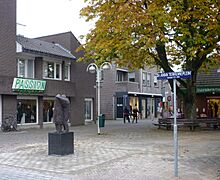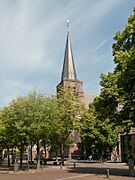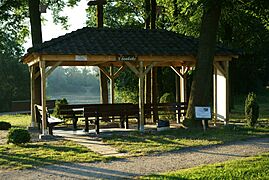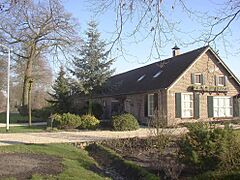Deurne, Netherlands facts for kids
Quick facts for kids
Deurne
|
|||
|---|---|---|---|

Klein Kasteel castle in Deurne
|
|||
|
|||
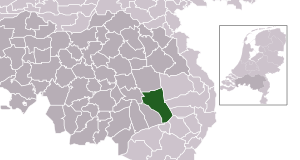
Location in North Brabant
|
|||
| Country | Netherlands | ||
| Province | North Brabant | ||
| Government | |||
| • Body | Municipal council | ||
| Area | |||
| • Total | 118.36 km2 (45.70 sq mi) | ||
| • Land | 117.03 km2 (45.19 sq mi) | ||
| • Water | 1.33 km2 (0.51 sq mi) | ||
| Elevation | 26 m (85 ft) | ||
| Population
(May 2014)
|
|||
| • Total | 31,711 | ||
| • Density | 271/km2 (700/sq mi) | ||
| Time zone | UTC+1 (CET) | ||
| • Summer (DST) | UTC+2 (CEST) | ||
| Postcode |
5750–5759
|
||
| Area code | 0493 | ||
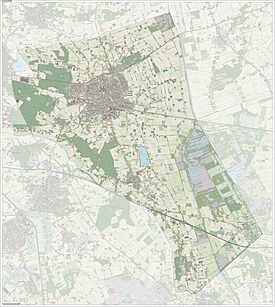 Dutch Topographic map of the municipality of Deurne, June 2015 Dutch Topographic map of the municipality of Deurne, June 2015 |
|||
Deurne (pronounced like "DOOR-nuh") is a rural area and a village in the Netherlands. It's located in the province of North Brabant. This municipality includes the villages of Liessel, Vlierden, Neerkant, and Helenaveen.
Deurne is home to about 31,711 people. It covers an area of 118.36 km2 (45.70 sq mi). It's a place where you can find both history and natural beauty.
Contents
A Look Back in Time: Deurne's History
Deurne was first mentioned way back in 721. It was called Durninum, which means "near or by thorns". For a long time, Deurne was just a group of small farming villages. These villages were located west of a large peat moor called the Peel.
How Deurne Grew
In the 1800s, things started to change for Deurne. A new railroad was built in 1866, connecting Eindhoven and Venlo. Also, a canal called the Zuid-Willemsvaart canal was finished in 1826. These new ways to travel and transport goods helped the area grow.
The peat from the moor was used for fuel. Even though the peat industry wasn't super profitable back then, clearing the land was important. People worked hard to prepare the land for agriculture and farming. This led to more people settling in Deurne.
Today, only small parts of the old peat moor remain. Some areas have even been reflooded to create mini wetlands. These wetlands are scattered along a special fault line that helped create the moor in the first place.
Getting Around: Transportation
Deurne has its own Deurne railway station. This makes it easy for people to travel to and from the area by train.
Culture and Fun in Deurne
Deurne has a lively cultural scene. In 2009, a new "Cultural Centre" opened. It's called the Martien van Doorne Cultuur Centrum. This center is a great place for entertainment. You can watch plays, enjoy concerts, and even see movies there.
Local Language
The people of Deurne speak a local dialect called Peellands. This dialect is part of the East Brabantian group. It's actually very similar to the regular Dutch you hear every day.
Friends Around the World: Twin Towns
Deurne is "twinned" with two other towns in different countries. This means they have a special friendship and often share ideas and culture.
|
|
Famous Faces from Deurne
Many interesting people have come from Deurne. Here are a few:
- Lucas Gassel (born around 1488) was a famous painter from the Renaissance period. He was known for his beautiful landscape paintings.
- Aaltje Noordewier–Reddingius (1868–1949) was a Dutch classical singer (soprano) and a voice teacher.
- Jules de Corte (1924–1996) was a blind singer-songwriter from the Netherlands.
- Laurens van den Acker (born 1965) is a well-known automobile designer.
- Erik van Lieshout (born 1968) is a modern Dutch artist.
- Yara Kastelijn (born 1997) is a Dutch professional racing cyclist.
Gallery
See also
 In Spanish: Deurne para niños
In Spanish: Deurne para niños



